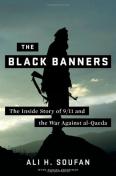
by Ali H. Soufan
Hardcover- $19.30
A book that will change the way we think about al-Qaeda, intelligence, and the events that forever changed America.
On September 11, 2001, ...Overall rating:
How would you rate this book?
Member ratings
In the introduction to the audio, the author reveals that some of the book has been redacted by the CIA. He doesn’t believe there is any reason for this, the CIA has no jurisdiction once the FBI has approved it, which they did, but still, they have made requested changes. He does not believe there are any secrets revealed in the book, but allowed the redacting so the book could be published on time. He has vowed to fight back and restore the book to its original state.
Born in Beirut, Lebanon, he was proud to be an American. Because he was brought up in a war torn country, he appreciated his life in America. When he interviewed for the job with the FBI, it was in response to a dare, but once he passed the interviews and exams, he decided he really did want to join. It excited him to be able to work to protect America. Admirably, he wanted to give something back to the country that had given him so much. Fluent in Arabic, he is perfect for the job. He began working there in 1998. His Middle Eastern background, and his assertiveness, helped him rise through the ranks and move ahead within the departments he was involved.
Soufan’s command of the Arabic language and his familiarity and understanding of the Koran was sometimes better than that of the prisoners he questioned. He believed that knowledge was key in questioning anyone, and he was often able to persuade those captured to confess when he was able to prove their beliefs, especially relating to Islam and the Koran, were inaccurate. He outsmarted many with his expertise. He did not believe in enhanced interrogation techniques or rendition, and according to his perception of events, he illustrates its failures. Many of his statements of fact seemed, indeed, however, to be a matter of opinion since there two distinctly diverse opinions exist about many of the events he describes.
Soufan provides information on several investigations, among which are the Kohl, 9/11, and Abu Ghraib and Bin Laden. He informs the reader about the background of many members of Al Quaeda, revealing their personalities and how they got to their positions and involvement in the organization, migrating over from the Mujahedeen. He also describes the personalities of the people he worked with in the FBI. Sometimes it felt to me like they had a good old boy group mentality; they “protected the herd”.
When describing his many investigations, he reveals the lack of cooperation existing in the government organizations with oversight. The CIA would not share information with the FBI, the ambassador to Yemen, Bodine, inhibited the investigation, being more concerned with protecting the Yemeni opinion and reaction to the United States, than with helping to capture terrorists and bringing those involved in the Kohl attack to justice.
The disorganization and lack of cooperation among the higher-ups in the CIA, the State Department, the FBI, and also the roadblocks set up by the ambassador to Yemen disrupted the investigations, and it is implied, perhaps led to the bombing of the World Trade Center. Had the information been shared, they might have been able to connect the dots and the outcome might have been different, not only for that attack, but for others as well. They were aware of many of the planners who implemented the process and also of many of those involved in the actual deeds. Had politics not played such a large role in many of the investigations, some alleged and/or suspected terrorist attacks might have been avoided.
There is a lot of information provided that I was not aware of and some that I cannot be certain was true. I wondered if some viewpoints and/or opinions given as facts, depended on political proclivities. It certainly sounded, at times, like the White House was at fault for many of the delays in the investigation and that may have led to unnecessary deaths. However, the author seems to lean left and does not seem to judge the left and right equally with regard to terrorism and its tactics. Also, for the most part, he blames everyone for all the failures except for the FBI, the agency for which he worked.
The book, as an audio, seemed too long and too detailed. The myriad names were confusing. The redacted and blank parts were enormously distracting and tedious, and quite frankly, annoying. Listening to words that literally said, blank said blank to blank, was meaningless. It could have been a really good book, but instead, it became mediocre. Perhaps they shouldn’t have rushed to publication, perhaps they should republish when they can get rid of the blank told this and the blank said this in blank location and provide the reader with real facts instead of blank ones.
Book Club HQ to over 90,000+ book clubs and ready to welcome yours.
Get free weekly updates on top club picks, book giveaways, author events and more








